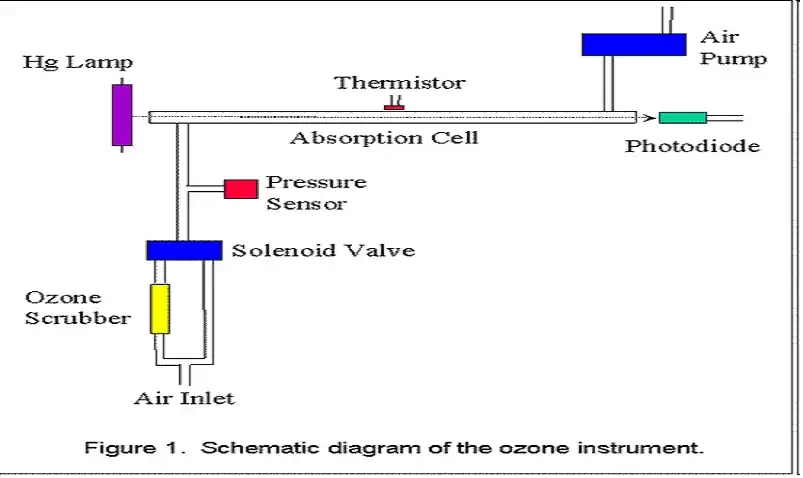An ozone monitor is electronic equipment that monitors for ozone concentrations in the air. The instrument may be used to monitor ozone values for industrial applications or to determine the amount of ambient ozone at ground level and determine whether these values violate National Ambient Air Quality Standards (NAAQS).
The ozone molecule absorbs ultraviolet radiation, and most ozone monitors utilized in regulatory applications use ultraviolet absorption to accurately quantify ozone levels. An ozone monitor of this type operates by pulling an air sample from the atmosphere into the machine with an air pump.[1] During one cycle, the ozone monitor will take one air sample through the air inlet, and scrub the ozone from the air; for the next cycle, an air sample bypasses the scrubber and the ozone value calculated. The solenoid valve is electronically activated to shift the air flow either through the scrubber or to bypass it on a timed sequence. The difference between the two sampled values determines the actual ozone value at that time. The monitor may also have options to account for air pressure and air temperature to calculate the value of ozone.

The concentration of ozone is determined using the Beer-Lambert Law that basically says that the absorption of light is proportional to the concentration. For ozone, a 254 nanometer wavelength of light created by a mercury lamp is shined through a specific length of tubing with reflective mirrors. A photodiode at the other end of the tube detects the changes of brightness from the light.
The onboard electronics process the values obtained and display the value on the screen and can also output an electrical signal in volts or a 4-20 mA current that can be read by an electronic data logger. Other options for output are RS232 serial port or ethernet or internal data storage on flash memory.
See also
References
- ↑ "Archived copy" (PDF). Archived from the original (PDF) on 2018-12-04. Retrieved 2015-04-18.
{{cite web}}: CS1 maint: archived copy as title (link)